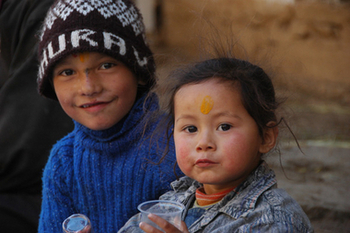Regional Economic Development Uttarakhand
Project description
Title: Regional Economic Development Uttarakhand
Commissioned by: German Federal Ministry for Economic Cooperation and Development (BMZ)
Country: India
Lead executing agency: Rural Development Department, Government of Uttarakhand
Overall term: 2007 to 2012

Context
India faces the significant challenge of combining its rapid economic growth with social equity and environmental sustainability. The new state of Uttarakhand has an agricultural subsistence economy in its mountain regions and dynamic industrial development in the plains. These divergent facets reinforce existing economic and social disparities. The state must therefore act to make its growth inclusive and should promote economic participation and empowerment, particularly for the rural and deprived groups. Its future success lies in unlocking the potential of its natural resources. The potential for growth can be strengthened further by exploiting the state's educational institutions as well as national-level centres of excellence for innovation in the local and regional economy.
Objective
The overall economic, social and institutional environment for inclusive growth has improved, giving rural, marginalised and deprived groups an opportunity to participate in the economy. Selected value-chains receive support; the framework for MSMEs' market access and development has improved; and Uttarakhand is being promoted as a regional market.
Approach
GIZ's Regional Economic Development programme is based with the Uttarakhand Government's Department of Rural Development, where it is helping the state to bridge the existing economic divide. It combines activities designed to promote social equity, inclusive growth and poverty reduction, with uses of the rich natural resource base that ensure ecological stability. The programme aims to make markets work for the poor, stimulating market forces where possible to enable economic participation. It relies on dialogue amongst key actors and on partnerships between public, private and civil society organisations. It comprises three specific areas of action:
- Promoting regional frameworks for inclusive market development: This means improving the business and market environment by strengthening cooperation between the state government, regional and local administrative bodies, associations and the business sector. GIZ is helping to establish institutional platforms to foster public-private dialogue on regional economic development, and it is promoting MSMEs and the demand for their services.
- Regional marketing and promotion of Uttarakhand: Here the focus is on tourism, specific agricultural products and efforts to build the state's image. The programme supports strategy development at institutional level and regional marketing activities, such as a promotional brochure and participation in national and international trade fairs.
- Developing value chains: The programme is strengthening business relationships between key stakeholders in selected sub-sectors and helping the stakeholders in marginalised regions to integrate in existing and new markets. At regional level, GIZ has collaborated with NABARD to establish a mechanism of support MSMEs in selected sub-sectors in rural and hill areas.
The programme focuses on creating business and investment opportunities that link rural economies. It therefore complements the current rural development agenda of the state government and is a partner of the Uttarakhand Livelihood Improvement Project for the Himalayas, which is financed by the International Fund for Agricultural Development (IFAD). The programme is also coordinated with some of GIZ's other initiatives in India, for example in the fields of rural finance and SME development.
Results achieved so far
Early success stories include the promotion of medicinal plant value chains. The programme has facilitated meetings between buyers and sellers, which have helped improve price transparency and also to raise prices for the producers (by almost 200 %). A contract with a Dutch buyer was established as a result of the programme activities. Mobile phone-based information services for farmers have also been developed, giving the users up-to-date local and customised information on commodity prices, the weather and other news.
In terms of regional marketing, the programme has supported the development of an action plan to strengthen Uttarakhand's regional brand for tourism. The Uttarakhand Tourism Board and a number of civil society organisations are now putting the plan into action, and a marketing organisation for MSME and producer groups has been established. A strategy to promote responsible tourism has been developed and implemented, and the state has participated in trade fairs, such as the ITB tourism fair in Berlin.